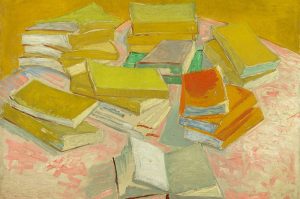Summer has arrived in full force — at least here in southeastern Virginia, where the temperature has been creeping up towards 100 degrees — and so, too, have those lists of the best beach books, hottest summer reads, high temp tomes, etc. But fall is just around the corner, so why not take a peek at what’s in store?
Here are a few forthcoming books that piqued my interest for one reason or another. This isn’t a list of the fall’s “biggest” books. Some of these might not be covered at all in the national press. But if you want a list like that, just wait. You’ll have 20 to choose from before long. Here is mine.
Robert Crawford’s Eliot after The Waste Land (August 23, FSG), the second volume of his biography of T.S. Eliot, will be covered in the national and international press, much like Crawford’s first volume, Young Eliot. In my review of Young Eliot, I wrote that “Crawford has apparently chased down every fact or detail that has any connection with Eliot’s life.” It seems that his Eliot after The Waste Land will be similarly comprehensive. I am particularly interested in Crawford’s discussion of Eliot’s conversion and his separation from Vivien Haigh-Wood.
I am also excited about two Russian novels from the NYRB Classics. The first is a new translation of Ivan Turgenev’s Fathers and Sons, titled Fathers and Children (August 23) in the new translation, following the example of Constance Garnett and others, by Nicolas Pasternak Slater (the nephew of Boris Pasternak) and his wife, Maya Slater. The publishers have pitched the book as a more literal translation of the Russian. How will it measure up? I’m very curious. The other is Vladimir Sorokin’s novel Telluria (August 16). I have never read Sorokin, so I don’t know what to expect, but this description caught my attention: “Telluria is set in the future, when a devastating holy war between Europe and Islam has succeeded in returning the world to the torpor and disorganization of the Middle Ages.” They had me at “devastating holy war.” How will it compare to Houellebecq’s Submission?
;768:[300×250,336×280,320×100];0:[300×250,320×100,320×50]”]I have a soft spot for martial arts (I have learned just enough to be dangerous to myself and no one else) and kung fu movies. Wilson Yip’s 2008 film Ip Man, starring Donnie Yen and Lynn Xiong, is probably one of the best martial arts films of the 21st century. War of Arrows is another great one. All that to say, I can’t resist giving this “cultural history” of Bruce Lee from New York University Press (August 9) a shot.
Yet another August release (which is usually a quiet month in publishing) is Robert Lowell’s Memoirs (August 2), which he wrote in the 1950s and never published. Lowell made an autobiographical turn in his poetry around the same time with Life Studies, and so it will be interesting to see what Memoirs tells us about that turn. But the volume also contains his recollections of Eliot, Frost, Pound, John Berryman, Anne Sexton, Sylvia Plath, and others.
On September 6, the North American edition of Katherine Rundell’s innovate study of the life and work of the poet John Donne, Super-Infinite: The Transformation of John Donne, will be published. Many British reviewers have praised its accessibility and whimsy. Lara Feigel lauds Rundell’s “zest for imaginative speculation.” John Phipps writes that Super-Infinite is a “sensitive, witty, slim and abundant book.” And in the New Statesman, Rowan Williams writes that “Katherine Rundell does in this book what any good literary biographer must do: share…wonder and delight.” Others have found it annoying. In the Times Literary Supplement, Helen Hackett complains that Rundell’s “larkiness” can become “strained.” Who’s right? I’d like to know.
Lord Rowan Williams has his own book out in September, an anthology of 100 poems over the past 100 years that “impel you to search your heart.” Appeals to my heart don’t usually have me reaching for my wallet, but I’ve got a professional interest in Lord Williams’s anthology. I’m curious to know which poems he picked and if any of them are the same as the ones I and my co-editor, Sally Thomas, picked for our own anthology, which is coming out in September: Christian Poetry in America Since 1940.
Last, I’m much looking forward to reading Lionel Shriver’s collection of essays, Abominations, some of which first appeared in this magazine. The collection shows Shriver at her most “iconoclastic,” which is the most interesting Shriver. Happy reading!
;768:[300×250,336×280,320×100];0:[300×250,320×100,320×50]”]
























